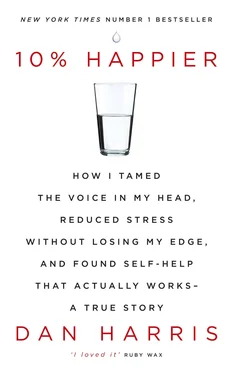I also started to appreciate that even though the morning audience was smaller than the evening audience, the relationship with the viewers was much more intimate and intense, the result of the fact that the format was looser and more personal. Morning TV, I came to see, was a potent way to convey useful and important information. Being in people’s living rooms and bedrooms as they prepared for their day, and discussing current events in a more casual manner, had a unique impact—perhaps even more powerful, at times, than the intoning-from-the-mountaintop nature of evening news. I felt enormously lucky to have the job.
The intimacy with the audience was, however, a double-edged sword. While I enjoyed the opportunity to chat with viewers via Facebook and Twitter (as a broadcaster, you’re always curious about people who watch), I couldn’t help but notice that people felt free to share their opinions about me in ways that an evening news anchor rarely endures. I kept a file in which I saved some of my favorite messages (in their original, uncorrected form):
“will you plz unbutton ur jacket????? U look uncomfortable:)”
“Please please please tell Dan to sit squarely at the desk and QUIT leaning to his right, the viewers left towards Bianna. It is so distracting.”
“make dan go away please”
“Just thought i would let you know that your tie doesnt look centered it almost looks crooked.”
“Don you have a hair out place that is making you look like ALALFA!”
“please do me a favor, slow the blank down and stop trying to take over the show. it makes you look like a major clown.”
“u should really dvr @gma and listen to yourself. As u give the news and the story is of a serious nature u shouldn’t sound happy.”
I was, in fact, DVRing myself—and my criticism of my own performance was much harsher than anything the viewers had to offer. I was not a huge fan of the guy I saw on television enthusing about the waistcoated kangaroo.
This was where meditation really paid off. Post-retreat, I was up to thirty minutes a day. Every morning, I would scan my calendar to figure out when I was going to be able to fit in work, meditation, exercise, and spending time with Bianca. Some afternoons I’d bang out my thirty minutes on my office couch as I awaited script approval from World News or whichever show had assigned me a story. I didn’t necessarily look forward to sitting. In fact, the first thought to pop into my head after I’d shut my eyes was usually How the hell am I going to do this for a half hour? But then I’d see the thought for what it was: just a thought. I rarely missed a day, and when I did, I would feel not only guilty, but also less mindful.
When I got tense about work, I would watch how it was manifesting in my body—the buzzing in my chest, my earlobes getting hot, the heaviness in my head. Investigating and labeling my feelings really did put them in perspective; they seemed much less solid. The RAIN routine, plus Joseph’s “is this useful?” mantra, almost always helped me snap out of it.
But while meditation made me more resilient, it certainly was not a cure-all. First, it didn’t magically make me looser on GMA . Second, while I recovered more quickly, it didn’t seem to prevent all churning. On some weekend mornings, I walked out of our studios haunted by Irwin the kangaroo.
On one such day, I left the office and headed downtown for brunch with Mark Epstein. In the two years since I’d met him, we had become genuine friends. He and his wife, a talented and successful artist named Arlene, had been to our apartment for dinner. Bianca and I had been to their airy downtown loft—and also met their two grown children. When I went to spend time with Mark solo, Bianca—who adored the guy—was just a tiny bit jealous.
I tried to orchestrate a get-together once every two or three months. Usually, it would be brunch after one of my weekend GMA shifts, and before Mark headed upstate to the country house where Arlene had her studio. I’d be the only one in the restaurant wearing a suit.
On this morning, having long since branched out from the Tribeca Grand, we were meeting at one of our other regular spots: Morandi, an Italian bistro in the West Village. I arrived with a list of items in the “Questions for Mark” file in my BlackBerry. Chief among them: Even though I was rebounding more quickly, were my self-recriminations over my job performance a sign that I was somehow a JV meditator? Should mindfulness be more effective at extinguishing this kind of thing?
“How would I accurately describe how meditation is helping me here? It’s just allowing me to step back and watch it all happen, nanoseconds at a time, and through that process it takes some of the fangs out of it?”
“Yes,” he said.
“It’s not going to make it go away.”
“No. It might help it go away a little quicker. It might. It might ,” he said, his head shaking slightly as he carefully chose his words. “To the extent that it loosens the way you would ordinarily be caught by how terrible this all is, it might loosen your own attachment to whatever melodrama is unfolding.”
“My remedy these days combines some things that are non-meditative,” I said. “I think to myself, ‘So if this whole thing blows up, what’s the worst-case scenario? I lose my job? I still have a wife who loves me—and the only person who can ruin that is me.’ It works, but it has nothing to do with meditation.”
“No—that’s insight!” As he spoke, his voice rose an octave with insistence.
“Insight into the nature of reality?” I asked sarcastically.
“Yeah,” he said, not taking the bait. “That’s insight, because you’re not clinging to success so seriously.”
“But maybe I’m just clinging to Bianca.”
“That’s better. You’re clinging to something that’s far more substantial.”
As I sat there mulling Mark’s words while wolfing overpriced eggs, my new 10% happier slogan began to make even more sense. It was a reminder of the message Mark had delivered a year ago, when I was unsure about whether David Westin was going to give me the GMA promotion. Back then, at our Tribeca Grand beer summit, Mark had helped me see that the point of getting behind the waterfall wasn’t to magically solve all of your problems, only to handle them better, by creating space between stimulus and response. It was about mitigation, not alleviation. Even after decades of practice, Mark—who, unlike Joseph, made no claims to any level of enlightenment—told me, “I still suffer like a normal person.” (When I asked him what kind of suffering was most common for him, he said something about dealing with self-pity, but didn’t elaborate.)
Moreover, I could now see how the mitigation Mark was pitching had real-world consequences. For example, it allowed me to acknowledge my performance issues rather than pretend they didn’t exist. Perhaps most important, it made me easier to live with. Bianca said she couldn’t remember the last time I walked into the apartment scowling, even when I’d had a particularly tough day. Her only beef was that she had to tiptoe around the apartment if I was meditating in the bedroom. (While she was a believer in the potential of meditation, she was not doing that much herself. On those occasions when I saw her stressed about work, it took restraint not to recommend that she start her own practice. I was pretty sure, though, that proselytizing would make her want to throttle me, and that the smarter play was just to listen sympathetically.)
Much as it had been with my Iraqi friend Dan, it was illuminating to view my own struggles as a morning-show host through the lens of “suffering.” In a world characterized by impermanence, where all of our pleasures are fleeting, I had subconsciously assumed that if only I could get the weekend GMA gig, I would achieve bulletproof satisfaction—and I was shocked when it didn’t work out that way. This, as Joseph had pointed out on retreat, is the lie we tell ourselves our whole lives: as soon as we get the next meal, party, vacation, sexual encounter, as soon as we get married, get a promotion, get to the airport check-in, get through security and consume a bouquet of Auntie Anne’s Cinnamon Sugar Stix, we’ll feel really good. But as soon as we find ourselves in the airport gate area, having ingested 470 calories’ worth of sugar and fat before dinner, we don’t bother to examine the lie that fuels our lives. We tell ourselves we’ll sleep it off, take a run, eat a healthy breakfast, and then, finally, everything will be complete. We live so much of our lives pushed forward by these “if only” thoughts, and yet the itch remains. The pursuit of happiness becomes the source of our unhappiness.
Читать дальше












